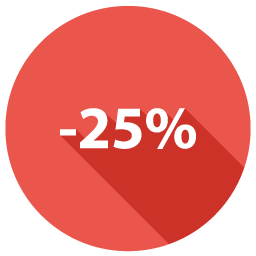The fee-effect: Increase sales by offering a product promotion for a symbolic price instead of for free
Relevant topics Archive, Conversion
So people love free stuff. Always have, always will. Especially the Dutchies. We crave for free stuff, but that’s another discussion. But is free always the best option?
If you’re a marketer or entrepreneur and you tend to give away promotion products for free in order to generate more sales or bind customers: keep reading. All this time you have been doing it completely wrong.
A group of behavioral scientists investigated the effect of product upgrades on customer appreciations and sales. This is what they discovered: asking a symbolic price for an upgrade might be more effective than to give it away for free! This is because customers will experience more appreciation, which will generate more sales. So fee instead of free, called ‘The fee-effect’.
The fee-effect
So let’s put this incredible finding into practice. I just love coffee, so let´s work with that. I want to buy a new Nespresso machine. I saved up and head to the store. There are two scenarios:
1. With a Nespresso machine, receive 10 free coffee pads!
2. With a Nespresso machine, receive 10 coffee pads for only €1!
According to these Chinese scientists, the second option will result in a higher customer satisfaction and therefore generate more sales. This is because a symbolic fee will increase more appreciation compared to a free offer, called the fee-effect.
Amazing how paying can create more satisfaction than receiving free stuff…
The scientists claim this fee-effect also to be the case with smaller promotions, like buying a pizza and receiving the second one for a symbolic price like €1. Or buying an electric razor and receiving 2 extra blades for a symbolic price.
Let’s put it to the test
OK, so now we know that offering products for a symbolic fee could generate more sales than offering something for free. However, the scientists only tested this for physical products. But I wonder, would it also work for services? Let’s try this. Imagine yourself going on a trip with friends and when checking in at the hotel, one of these 2 scenarios occur:
1. The receptionist offers you a free upgrade for a luxury room
2. The receptionist offers you an upgrade for a luxury room for only $1
What do you think would work better for you?
According to the scientists that would be the second option. Just think about it: when you would check in at a hotel and they would offer you a free upgrade, wouldn’t you wonder what was wrong with the initial room? On the other hand, a symbolic price of only €1 would also be rather unrealistic, wouldn’t it? Perhaps the fee-effect doesn’t work for services, as it needlessly triggers the customer’ alarm bells. This definitely asks for some future research.
So in conclusion:
1. Asking a symbolic price for an upgrade might be more effective than to give it away for free.
2. This is because customers will experience more appreciation, which in turn will increase sales.
However, keep the following in mind: the scientists only tested this principle on products, NOT on services!
Further Reading
-
The Boomerang Effect of Discounts - Why Lower Prices Can Backfire and How to Avoid a Decrease in Sales
Discover how to improve sales by applying the right discounts for the right products.


